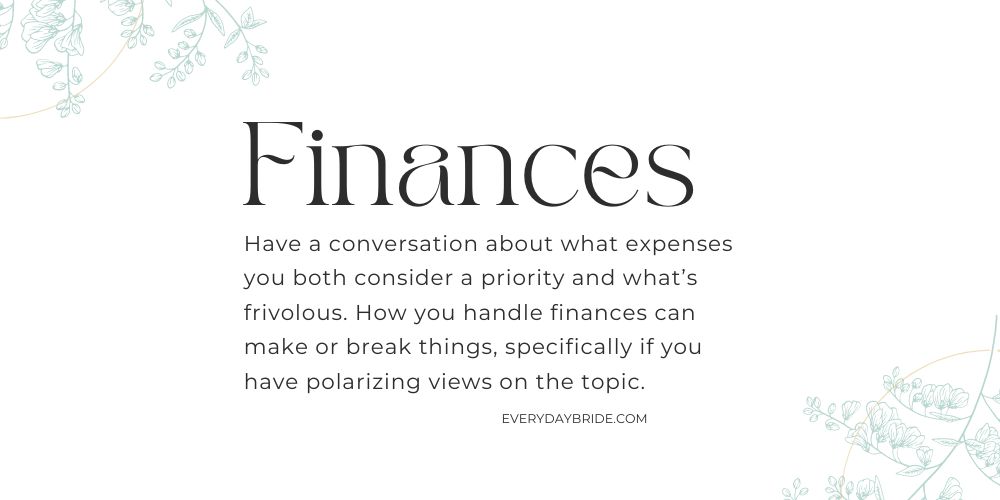Marriage is a big step in a relationship, but it’s an exciting one. As you and your partner begin having conversations about your future together, you should talk about:
- Finances
- Relationships
- Boundaries
- Lifestyle
- Future plans
Discussing these topics with your fiancé before the wedding gives both of you a clearer picture of what to expect. Similar values decrease the risk of arguments, allowing you to spend your first year of married life creating a healthy foundation. Keep reading this guide for more details on how you should talk about each topic.

Finances
First and foremost, you need to talk about money. Have a conversation about what expenses you both consider a priority and what’s frivolous. How you handle finances can make or break things, specifically if you have polarizing views on the topic.
If one partner makes a lot of frivolous purchases, the other could feel annoyed or view this as wasteful. When you get married, you share expenses, even if you have separate accounts. No one should feel like they always have to front the check.
Overspending can also increase the risk of debt or poor credit scores. Talking about your financial history and personal value of money up front can help prevent arguments down the line. During married life, you’ll make many big purchases together, like buying cars, a home, and more.
Conversation Tip
You should also be on the same page about value compared to price. If one partner is more worldly, they may believe it’s better to buy the newest model rather than the most affordable one for your money. There is no incorrect view on these things, but you should be on the same page or willing to meet in the middle on financial beliefs.
Property Ownership
Now is also the time to discuss prenups and how you’ll split up your property. Will you purchase two separate cars or buy both together and share? Some couples have a single account for all their money, while others keep things separate. You could also keep individual bank accounts for personal purchases but have a joint account for major expenses like utility bills, groceries, and other living expenses.

Important Life Relationships
This is another vital topic to discuss with your fiancé before the wedding because we have all sorts of relationships in life, and each fills a different need. When it comes to talking about this, discuss the following:
- Importance of each relationship
- Which relationships take priority
- What makes a healthy relationship
- What you expect in a married relationship
Noting these things can be especially important when deciding how you’ll spend your holidays. Many couples trade off which side of the family they celebrate with, especially if both see family as a priority.
Family Relationships
You should talk about how both of you view other relations with friends and relatives. Things may only work short term if one person values family time while the other prefers seeing their friends.
The good news is, if you’ve been together for a while, you can usually gauge based on their actions. For example, does your partner ditch family events to go out with friends? How often do they talk to their family? Answering these questions gives you a clearer idea of how much value they put on those relationships.
Some people don’t get along with their families due to conflicting beliefs, past trauma, etc. If your partner constantly shies away from the topic of family, approach with compassion so you can understand. Family is important to many of us, and just because someone isn’t close to their family doesn’t mean they don’t value the one you two will build.
Cultural Values
The beautiful thing about love is that it can bring together two people from different walks of life. If you come from different cultures, take time to discuss significant ceremonies or holidays you may celebrate. This will make planning a multicultural wedding where everyone feels respected easier.
Talk About Dating History
Another major set of relationships you should talk about is your dating history. Discuss your past relationships and what went wrong on both sides. Talk about what your previous partner did wrong and your shortcomings. For example, maybe you have difficulty communicating or expressing your emotions and shut down when faced with confrontation.
This may have frustrated past partners. Talking with your future spouse about this helps them better understand you and meet your needs. Every couple bickers, and you don’t want that to be your downfall.

Lay Out Boundaries
You must also bring up personal boundaries so neither of you crosses the line. We all have limits, which are often a result of our experiences or values. Take time to talk about behaviors that aren’t acceptable in the house.
Being vulnerable isn’t easy, but it paves the foundation for your marriage and enhances your communication. Your partner should be the person you feel safest with, and they can only do this if they know what makes you most comfortable.

Lifestyle Preferences
Our lifestyles play a big role in our personalities and interests. Some people are minimalists, so they don’t want clutter in the house. Similarly, adventurous individuals love seeking out the next thrill! While you don’t need to have the exact same lifestyle, you should have an interest in some of the things your partner likes.
Introverts and extroverts also have different approaches to social situations, but that doesn’t mean the relationship fails. How do you get around this? Talk things through. An introvert may not want to go out four days a week. Compromise by going out on one or two days and staying home for the other two. The extrovert in the relationship may also spend time going out with their friends while their partner recharges at home.
Find Your Balance
Being too similar can be as challenging as being complete opposites. Marriage is about finding your best friend: the person who completes you because they have the traits you lack. Perhaps your partner is a spontaneous globetrotter, and you enjoy traveling but with an established plan.
This works because you share an interest in traveling but balance one another in the ways you view it. Sometimes, you need a plan, but making spur-of-the-moment decisions also lessens the risk of missing out on unique vacation experiences.

Your Future
Your future is one of the most important topics to bring up, and you need to talk about personal goals plus the partnership. If you have specific aspirations you’d like to reach in your career, share this with your partner so they can help encourage you to get there.
Do You Plan To Have Kids?
Children are a big part of the future, and deciding where you stand before saying your vows is best. Some people prefer a child-free life, while others see the joy in raising adorable tiny humans alongside the love of their life.
Like any belief, there is no wrong answer to the question of having kids, but you do need to respect one another. If one of you wants kids, but the other doesn’t, continuing the relationship wouldn’t be fair. Some compromises are easy to make, but this isn’t one of those circumstances and will majorly shape your future. Caving to align with your partner on this can lead to resentment in the future if you end up having regrets.
Parenting Styles
If you both want to have kids, you should also talk about how you’ll raise them. Compare your own upbringings and note what did and didn’t work so you can create the best plan for future children. Two contrasting parenting styles could clash.
A Closing Note: Don’t Fear Vulnerability
There’s beauty in raw emotion, and these types of conversations aren’t always easy to have. But being open with your partner creates a new kind of trust between the two of you.
Although it’s a challenge, vulnerability is powerful and benefits your relationship. Once married, you’ll rely on one another for comfort as you navigate life and its challenges. Working as a team is easier when you are on the same page about these core values.


